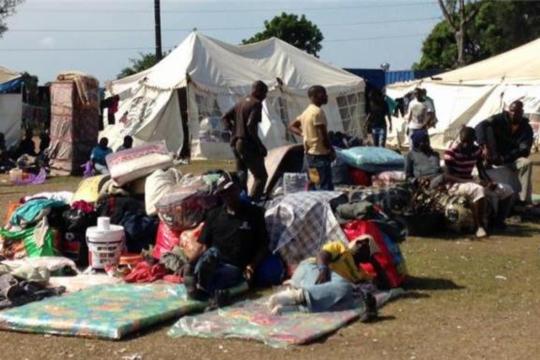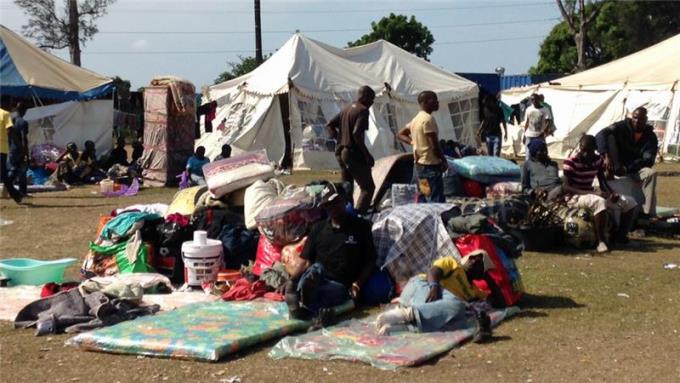
 |
| Thousands of Africans have fled violence and poverty, only to be met with more of the same [AlJazeera] |
| Abstract The migration of Africans to Europe has generated many headlines recently. Africans continue to attempt the dangerous and difficult journey through the desert and sea to Europe. Many immigrants who take this journey come from the African heartland to the coast of Libya, and this has resulted in many deaths over the past months. The South-South migration of Africans, mainly to South Africa and Botswana, has also been in headlines. Most recently, tensions spun out of control as some South Africans began attacking African migrants and called for their expulsion from South Africa. The locals accuse the migrants of committing crimes and stealing their jobs, among many other grievances; however, there is a question of whether this tells the full story. This report will highlight the causes of continued African immigration to South Africa, then explain the reasons for the sudden violent backlash against African migrants in South Africa. |
Introduction
More people are leaving their countries in search of opportunities in other parts of the world. The last forty years have seen an exponential increase in the number of migrants. Two hundred million people live outside their home countries.(1) Sub-Saharan Africa is among the most affected regions by immigration in the world. Africans are nomadic, and their movement in the past was largely driven by personal pastoral needs and that of their livestock. The treaty of Berlin in 1885 led to the creation of new borders that resulted in skewed wealth and natural resource distribution in the continent. Demands for adjustment of boundaries arbitrarily drawn by the colonial administration (which cut across economic and homogeneous ethnic groups), to accommodate the socio-cultural realities of the countries concerned and to regroup the populations of ethnic groups arbitrarily assigned to different countries, have led to war.(2) Consequently, some African leaders have initiated a discussion on the need to reconfigure the borders in Africa in order to reduce human hardship and facilitate free movement of people and goods.
Contemporary African migration challenges can be traced to poor migration regimes, environmental hardship and diseases. Basically, poor political leadership and planning has resulted in many African populations leaving their countries of birth in search of a better life elsewhere. Scores of people have perished as they risk the harsh deserts and the Mediterranean with the hope of reaching Europe. Another dangerous immigration of Africans that has equally claimed many lives is to the south of the continent of Africa. In 1991, South Africa and Botswana hosted 510,000 and 10,000 migrants, respectively. By 2010, those numbers had risen to 1.2 million and 76,000, respectively.(3) Africans have been moving to South Africa in particular since the dawn of the first democratic government in South Africa in 1994. South Africa has relied on her African neighbours for support for the better part of her political struggle against apartheid, and this explains the attractiveness of South Africa to many African immigrants. Following the national elections which brought Nelson Mandela’s coalition government to power, illegal immigrants have flocked to South Africa in the hope that the Mandela government would be more sympathetic to their interests than the previous governments.(4) South African political refugees, albeit not in large numbers, were sprinkled across the continent during apartheid. The difficulties associated with crossing the borders, and the one-way ticket policy instituted on blacks by the apartheid regime, limited the number of South Africans who went to exile.
Backlash against African immigrants in South Africa
The new South African government had to deal with very difficult challenges in its political infancy. Furthermore, in its efforts to demonstrate readiness to govern and understanding of the world and its agenda, South Africa ratified certain international treaties and procedures. Subsequently, the poor felt betrayed and began backlashing against the government. Various civil society organisations emerged to challenge the new government impositions.
The assimilation of African immigrants in South Africa was sudden and caught the new government by surprise. South Africa’s borders, once heavily guarded by government troops fighting African National Congress guerrillas, have proven to be an ineffective barrier to the surge in illegal immigrants and refugees entering the country.(5) In a positive move towards addressing refugee concerns, South Africa reversed its long-standing policy of blocking United Nations protection and assistance for refugees within South African territory in 1993.(6) However, there has been widespread exploitation of the refugee-friendly regime of South Africa.
It is reasonable to say that the African National Congress (ANC)-led government did not anticipate backlash against the poor in South Africa. The country has been riddled with service delivery protests daily and those frustrations escalated and, according to many, led to the attacks on African immigrants. Mandla Bhungane, a black entrepreneur from South Western Townships (SOWETO), says his dream of owning a house in Hilbrow was dashed by the mass influx of immigrants.(7) Many in South African black townships echo similar sentiments. Hilbrow, in its so-called heyday, was regarded as the Manhattan of Johannesburg. The suburb is now residence to a large number of African immigrants and is riddled by crime and apparent structural decay.
In September 2001, days before al-Qaeda’s attack on the US, masses from around the world gathered in South Africa for the biggest international conference in the history of South Africa, the United Nations World Conference on Racism, Racial Discrimination, Xenophobia and Related Intolerances in Durban. The South African port city of Durban was chosen to host the conference because of its suitable climate and location. However, Durban was the epicentre of the recent anti-immigration violence that took place in South Africa. According to the South African Minister of Intelligence, Mr. David Mahlobo, the violence started in Isipingo, a town twenty kilometres south of Durban, after an African immigrant allegedly killed a South African over a petty dispute. The news of the slayed South African soon spread and violence against African immigrants ensued.
The situation of African immigrants in South Africa has not been always negative. However, more recently, there have been some who have been fuelling misguided sentiments against African immigrants, including some in the national leadership structures in South Africa. Many South Africans warmly received African immigrants in the early days of post-apartheid South Africa. The rising socioeconomic challenges in South Africa, particularly the high levels of HIV infections, high unemployment rate and high levels of crime, resulted in the change of attitudes towards the African immigrants. South Africans, when faced with these global challenges, like many around the world, have accused Africans immigrants of socioeconomic malfunctions. The brutal violence in South Africa against African immigrants, some of which was caught on camera, shocked the world.
Many specialists in the field of xenophobia, including John D. Clark, have linked the brutal nature of the recent attacks to the low levels of education, political history, culture and low social standards.(8) They have drawn similarities in the scale of brutality of the recent events in Durban to those in Europe. The anti-immigration sentiment in the Central African Republic against African immigrants has been the most severe in brutality and most severe in the scale of displacement in Africa in recent times. As of mid-May 2015, 554,800 people were displaced inside the CAR, and 359,834 had sought refuge in neighbouring countries, according to UNHCR estimates.(9)
Anti-immigration violence against African immigrants is also rising in Europe. It is a global phenomenon not restricted to South Africa. In April 2006, a 37-year-old Ethiopian engineer was beaten into a coma in Potsdam. News reports described his injuries from the beating as “unusual in their severity”. Right-wing movements in Europe have unleashed gruesome attacks against Africans immigrants in particular. On average, two racist attacks are taking place every day in Northern Ireland, with fears that Belfast is rapidly becoming the race hate capital of the UK.(10) In general, developed and developing countries around the world are experiencing a rise in anti-immigration movements and right-wing organisations. The rise of right-wing parties has been cyclical in Europe, where they tend to grow during economic downturns and fade during periods of growth.(11) This suggests that the adverse economic opportunity and lack of employment opportunities beget hostile attitudes towards immigrants.
Conclusion
African political leadership continues to fail many in Africa. Politicians spend most of their time plotting to prolong their tenure in office rather than prioritizing issues that affect the development of African societies.(12) On the list of the world’s twenty longest-serving leaders who are still in power, ten are from Africa.(13) Many hoped that the African Peer Review Mechanism (APRM) that was spearheaded by the former President of South Africa, Thabo Mbeki, would have reversed the misfortunes of African political leadership. Launched in 2003 by the African Union (AU), the APRM is a mutually agreed instrument voluntarily acceded to by the Member States of the AU as an African self-monitoring mechanism.(14) However, the APRM lost momentum after Thabo Mbeki left office in 2009. Today, several African countries are either facing wars or under some sort of dictatorship. The recent mass migration of Africans from Libyan ports, en-route to Europe, highlights the failed political leadership in Africa. Unfortunately, the AU, which is supposed to be leading in this regard, has once again fallen behind in dealing with the challenge and the hazards of African migration to the North and South. It is this indifference and incompetence that led many Africans to risk their lives in pursuit of another life elsewhere.
Finally, South Africans have demonstrated the ability to self-rectify, an interesting development in a continent where such occurrences often end up at the higher political decision bodies like the AU and the UN. The South African Minister of Police Mr. Nathi Nhleko reassured all affected communities by saying, “We take note that South Africans of all hues have come out strongly against the attacks on foreigners and foreign nationals in our country. And now that the situation is stabilizing, government is turning its attention to a long term and sustainable intervention that would address the underlying mind-sets that motivated these attacks in the first place”.(15)
_________________________________________
Copyright © 2015 Al Jazeera Centre for Studies, All rights reserved.
*Thembisa Fakude is a researcher at AlJazeera Centre for Studies.
References
1. Doris Witteler-Stiepelmann, “Initial Addresses”, in Migration and Displacement in Sub-Saharan Africa: The Security-Migration Nexus II, in ed. Clara Fischer and Ruth Vollmer, 8, https://www.bicc.de/uploads/tx_bicctools/brief39.pdf , accessed 20 May 2015
2. Aderanti Adepoju, “Migration and Socio-Economic Change in Africa”, International Social Science Journal 50(1979).
3. Adrian Kitimbo, “Is It Time for Open Borders in Southern Africa?”, Brenthurst Foundation, April 2014, http://www.thebrenthurstfoundation.org/Files/Brenthurst_Commisioned_Reports/Brenthurst-paper-201404-free-labour-movement-in-SADC.pdf , accessed 20 May 2015.
4. Liz Sly, “South Africa is the New Lure for Continent’s Refugees”, Chicago Tribune, 9 October 1994, http://articles.chicagotribune.com/1994-10-09/news/9410090444_1_south-africa-illegal-immigrants-army-patrol , accessed 7 June 2015.
5. Kevin Tessier, “The Challenge of Immigration Policy in the New South Africa”, Indiana Journal of Global Legal Studies 3(1995), http://www.repository.law.indiana.edu/cgi/viewcontent.cgi?article=1067&context=ijgls , accessed 20 May 2015.
7. Personal interview with Mandla Bhungane, Johannesburg, South Africa, 20 May 2015.
8. For example, see: John D. Clark, Worlds Apart: Civil Society and the Battle for Ethical Globalization, (Bloomfield, CT: Kumarian Press, 2003).
9. Khanyo Olwethu Mjamba, “10 of Africa’s Longest Serving Presidents”, African Identity, 10 November 2014, http://thisisafrica.me/10-africas-longest-serving-leaders/ , accessed 20 May 2015.
10. Chris Kilpatric, “Two Racist Attacks Every Day in Northern Ireland’s Race-Hate Crime Surge”, Belfast Telegraph,
http://www.belfasttelegraph.co.uk/news/northern-ireland/two-racist-attacks-every-day-in-northern-irelands-racehate-crime-surge-30202329.html , accessed 20 May 2015.
11. Sam Houskeeper, Alexi Stocker and Val Zuckerman, “Right-Wing Resurgence Haunts Europe”, Politics and Policy, http://politicsandpolicy.org/article/right-wing-resurgence-haunts-europe , accessed 20 May 2015
12. Thembisa Fakude, “New Era in Nigerian Politics”, AlJazeera Centre for Studies, 15 April 2015, http://studies.aljazeera.net/en/reports/2015/04/20154157454950346.htm .
13. Hannes M. Einsporm, “A Forgotten Crisis: Displacement in Central African Republic”, Migration Policy Institute, http://www.migrationpolicy.org/article/forgotten-crisis-displacement-central-african-republic , accessed on 20 May 2015.
14. Obi Akwani, “Racism Against Blacks is a Growing Trend in Europe”, IM Diversity, http://imdiversity.com/villages/global/racism-against-blacks-is-a-growing-trend-in-europe/ , accessed 20 May 2015.
15. South African Minister of Police Nathi Nhleko, “Campaign Against Xenophobia to Be Taken to All Provinces”, SABC, http://www.sabc.co.za/news/a/3fec3d8048144329bcfdfc78423ca9af/Campaign-against-xenophobia-to-be-taken-to-all-provinces-20152004 , accessed on 16 June 2015.
